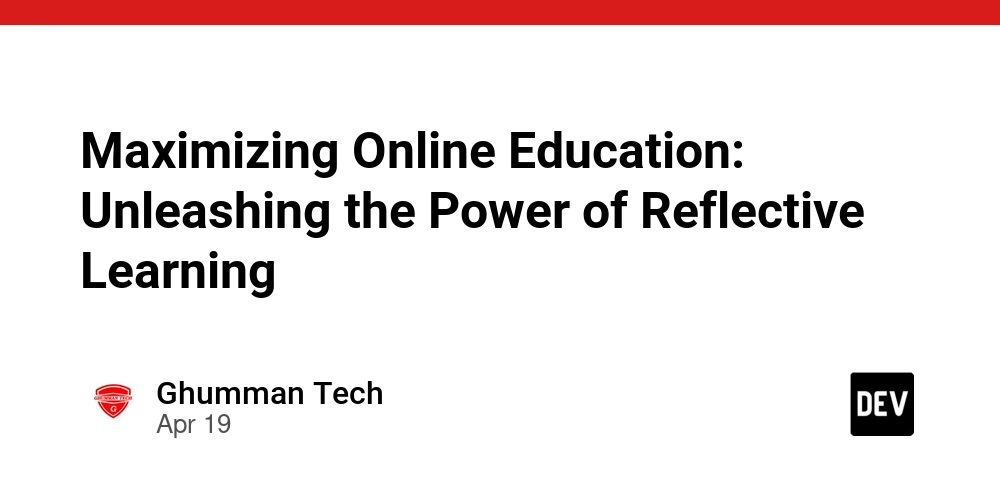Maximizing Online Education: Unleashing the Power of Reflective Learning
The advent of technology has revolutionized teaching and learning modes. Online education has gained tremendous popularity, not just in the formal education system but also in various corporate and professional training sectors. A critical component of the teaching-learning process that enhances the effectiveness of online education is 'reflective learning.' Reflective learning is a self-assessment mechanism where learners analyze their progress and identify the gaps. It encourages learners to ponder over their learning journey, understanding the concepts, applying the knowledge, and the challenges encountered. Reflective learning improves students’ perception of how they learn and what they learn, resulting in better time management, critical thinking skills, and personal development. Firstly, reflective learning promotes active engagement. It enables learners to play an active role in their learning process instead of being passive recipients of information. They reflect on what, how, and why they learn, which leads to a deeper understanding and retention of the knowledge gained. According to the Learning Pyramid by the National Training Laboratories, individuals retain approximately 90% of what they learn when they explain or teach others, a major benefit of reflective learning. Secondly, reflective learning enhances critical thinking. Engaging in self-reflection empowers learners to critically analyze the concepts they learn and the ability to apply this knowledge in various situations. It organically cultivates problem-solving skills and the ability to understand complex topics at depth. Reflective learning therefore turns learners into analytical thinkers who not only absorb knowledge but can also contextualize and utilize it meaningfully. Thirdly, reflective learning boosts self-confidence and independence. As learners invest more time in independent thinking, they begin to trust their problem-solving abilities. Reflective learning aids learners to take control of their knowledge acquisition path by fostering ownership and raising self-confidence in their learning capabilities. Finally, reflective learning allows users to review past learning and draw insights for future learning strategies, creating a more personalized learning experience. In online learning environments, reflective learning can be supported by various dynamic tools. Discussion forums, blogs, e-portfolios, and self-assessment quizzes can provide the perfect platforms for learners to reflect on their learning journey. Digital platforms also provide flexibility in terms of where, when, and how often learners can engage in reflective activities. Taking reflective notes and sharing them with peers can also enhance understanding as well as contribute towards collaborative learning. Incorporating reflective activities in educational programs helps learners understand and evaluate their learning habits, change ineffective learning strategies, assess their readiness for real-world tasks, and in general, be more self-aware. Despite all its benefits, the key to successful reflective learning is the learners’ willingness to engage actively in the reflective process and commitment to use it for improving future learning. Instructors, on their part, also need to provide continuous guidance and constructive feedback, and cultivate an environment that encourages reflective learning. In conclusion, online education equipped with reflective learning strategies offers numerous benefits. It promotes quality learning, cultivates critical thinking skills, builds confident and independent learners, and prepares them for future challenges. Reflective learning provides benefits beyond the conventional learning experience as it encourages learners to consider their learning journey as a continual process of improvement and growth.

The advent of technology has revolutionized teaching and learning modes. Online education has gained tremendous popularity, not just in the formal education system but also in various corporate and professional training sectors. A critical component of the teaching-learning process that enhances the effectiveness of online education is 'reflective learning.'
Reflective learning is a self-assessment mechanism where learners analyze their progress and identify the gaps. It encourages learners to ponder over their learning journey, understanding the concepts, applying the knowledge, and the challenges encountered. Reflective learning improves students’ perception of how they learn and what they learn, resulting in better time management, critical thinking skills, and personal development.
Firstly, reflective learning promotes active engagement. It enables learners to play an active role in their learning process instead of being passive recipients of information. They reflect on what, how, and why they learn, which leads to a deeper understanding and retention of the knowledge gained. According to the Learning Pyramid by the National Training Laboratories, individuals retain approximately 90% of what they learn when they explain or teach others, a major benefit of reflective learning.
Secondly, reflective learning enhances critical thinking. Engaging in self-reflection empowers learners to critically analyze the concepts they learn and the ability to apply this knowledge in various situations. It organically cultivates problem-solving skills and the ability to understand complex topics at depth. Reflective learning therefore turns learners into analytical thinkers who not only absorb knowledge but can also contextualize and utilize it meaningfully.
Thirdly, reflective learning boosts self-confidence and independence. As learners invest more time in independent thinking, they begin to trust their problem-solving abilities. Reflective learning aids learners to take control of their knowledge acquisition path by fostering ownership and raising self-confidence in their learning capabilities. Finally, reflective learning allows users to review past learning and draw insights for future learning strategies, creating a more personalized learning experience.
In online learning environments, reflective learning can be supported by various dynamic tools. Discussion forums, blogs, e-portfolios, and self-assessment quizzes can provide the perfect platforms for learners to reflect on their learning journey. Digital platforms also provide flexibility in terms of where, when, and how often learners can engage in reflective activities.
Taking reflective notes and sharing them with peers can also enhance understanding as well as contribute towards collaborative learning. Incorporating reflective activities in educational programs helps learners understand and evaluate their learning habits, change ineffective learning strategies, assess their readiness for real-world tasks, and in general, be more self-aware.
Despite all its benefits, the key to successful reflective learning is the learners’ willingness to engage actively in the reflective process and commitment to use it for improving future learning. Instructors, on their part, also need to provide continuous guidance and constructive feedback, and cultivate an environment that encourages reflective learning.
In conclusion, online education equipped with reflective learning strategies offers numerous benefits. It promotes quality learning, cultivates critical thinking skills, builds confident and independent learners, and prepares them for future challenges. Reflective learning provides benefits beyond the conventional learning experience as it encourages learners to consider their learning journey as a continual process of improvement and growth.










































































